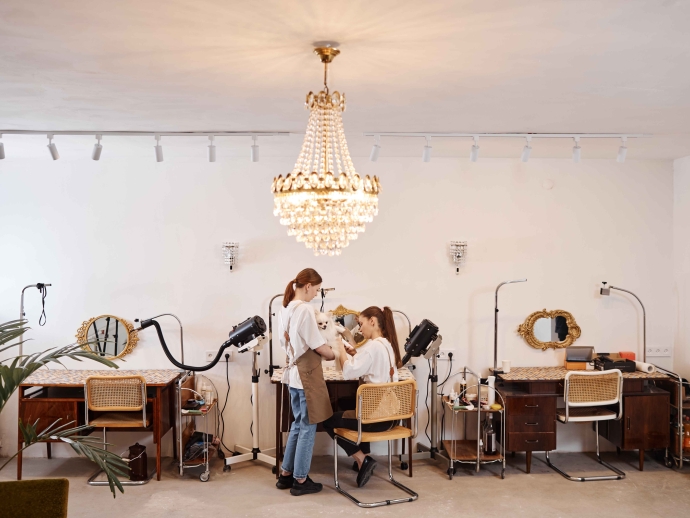Emergency Heat Not Working? Keep Your Dallas Salon Spring-Ready

Is your salon's heat pump not working when you need it most? When emergency heat stops working and cold air starts flowing, your Dallas salon business can quickly turn chaotic. One day your HVAC system is maintaining perfect room temperature, and the next, you're dealing with a heating emergency. A malfunctioning auxiliary heat system doesn't just mean uncomfortable clients – it affects your indoor air quality and energy costs.
Imagine your star stylist is handling a complex color treatment when the heat pump freezes up. Your clients are battling cold air under their capes, and your products aren't processing correctly due to poor temperature control. With aux heat not working, this scenario isn't just inconvenient; it's potentially devastating for your business's reputation.
Why Your Salon's Emergency Heat Not Working Is More Than Just an Inconvenience
Running a salon in Dallas requires a reliable heating system with dependable auxiliary heat. Your emergency heat mode serves as backup heating when the primary heat pump system struggles with freezing temperatures. Understanding your HVAC service needs and heating elements is crucial for preventing costly disruptions.
Understanding Emergency Heat in Your Salon
Your emergency heat setting acts as your heating system's insurance policy. When your heat pump emergency occurs, the backup electric heating kicks in. In salon environments, where airflow and temperature control are critical, having functional emergency heating is essential.
Common reasons for aux heat on but no heat include:
-
Thermostat issues (including Google Nest thermostat malfunctions)
-
Electrical wiring problems affecting the reversing valve
-
Clogged air filter restricting proper airflow
-
Circuit breaker issues affecting the air handler and condenser
-
Low refrigerant or refrigerant leak in the heat pump
-
Faulty combustion in natural gas heating systems
How Dallas Spring Weather Impacts Your Salon
Dallas springs challenge your HVAC technician with temperature swings. When auxiliary heat not working combines with freezing temperatures, you might face:
-
Poor indoor air quality affecting client comfort
-
Issues with water-based treatments
-
Problems with the furnace or boiler performance
-
Emergency heat mode failures requiring immediate HVAC service
Expert Tips for Troubleshooting Emergency Heat Issues
When your emergency heating fails, follow these steps:
-
Check Your Thermostat Settings
-
Verify software and password settings
-
Test the switch and valve controls
-
Confirm proper electrical connections
-
-
Inspect Air Filters
-
Check for proper engine and compressor function
-
Examine piping and duct conditions
-
Monitor fuel and oil levels
-
-
Examine Circuit Breakers
-
Look for issues with the heating element
-
Check wire connections
-
Evaluate light indicators on the control panel
-
Preventative HVAC Maintenance for Dallas Salon Success
Maintaining your emergency heat system requires:
-
Regular HVAC service checks
-
Smart thermostat monitoring
-
Proper air handler maintenance
-
Professional heat pump repair when needed
Working with Dallas HVAC Professionals
Choose an HVAC partner who:
-
Understands plumbing and electrical systems
-
Offers emergency request service
-
Maintains a marketing email list for service reminders
-
Provides user information and email address updates
Frequently Asked Questions
Q: What happens if emergency heat doesn't work?
A: When auxiliary heat fails, your heat pump may struggle with freezing conditions.
Q: Is it normal for a heat pump to not keep up in extreme cold?
A: Yes, which is why backup electric heating is crucial.
Q: Should I turn my heat pump to emergency heat in extreme cold?
A: Use emergency heat mode only when necessary to maintain room temperature.
Q: Is it OK to leave emergency heat on?
A: No, as it increases energy consumption and strains the heating system.
Taking Action: Your Next Steps
Don't wait until your emergency heat stops working completely. Schedule professional HVAC service today to ensure your heating emergency doesn't disrupt business.
Contact a qualified HVAC technician to:
-
Check airflow and heat pump operation
-
Maintain plumbing and electrical systems
-
Update thermostats and software
-
Provide ongoing maintenance plans
Remember, in the competitive Dallas salon market, maintaining proper indoor air quality and temperature control isn't optional – it's essential for business success.
Request service today to schedule your salon's HVAC inspection and keep your emergency heat system running efficiently all season long.

